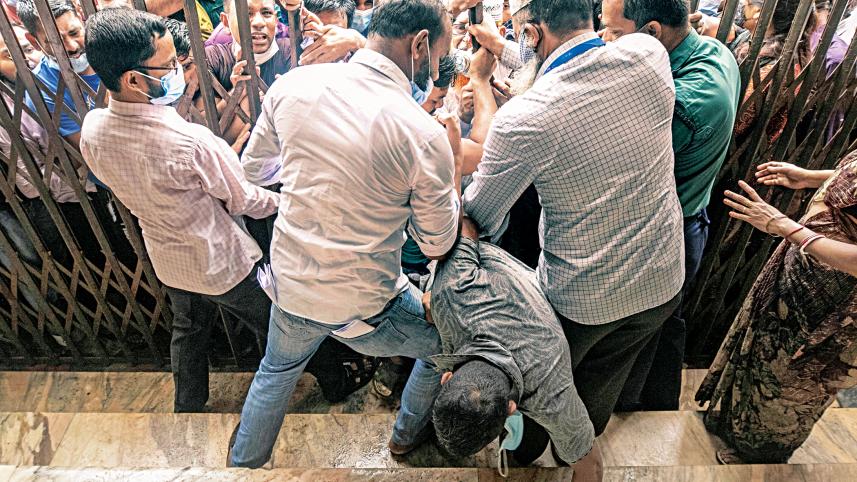An exercise in mega-mismanagement

To any casual observer, Saturday's daylong mass vaccination trial run—meant to set the stage for a planned special vaccination campaign starting on August 14—would appear as yet another exhibition of our failures to fashion a workable response against Covid-19. It was an operation poorly planned and executed—there was no surprise there. According to our correspondents, people showed genuine enthusiasm to get vaccinated by spontaneously turning up at designated centres across the country. But there were just way more people than there were vaccines available. The whole exercise was marred by chaos, mismanagement and lack of coordination, as many centres ran out of doses two or three hours after vaccination began. In many places, people were seen standing in mile-long queues on roads, crowds jammed themselves into the centres, and protests and brawls broke out.
If the purpose of this exercise, as the health minister had earlier said, was to identify the problems of vaccine rollout and fix those before the main drive, it's evident that it will require a lot of fixing. Unfortunately, there is a lot to be done but not a lot of time to do it in. The trial run came at a time when the country just recorded its deadliest week during this pandemic. On Saturday, Bangladesh recorded 261 deaths from Covid-19—the second-highest daily death toll from Covid-19. Just two days ago, it had recorded 264 deaths, the highest single-day toll. Overall, a total of 1,726 died from Covid-19 in the past week, an increase of 5.3 percent from the week earlier, according to the data of the Directorate General of Health Services (DGHS). Meanwhile, infections continue to be on the rise.
What these grim numbers tell us, beyond the urgency of further improving the treatment and testing protocols, is that we must now, more than any time before, build a functioning vaccination system based on timely supply and proper delivery. The time of experimentation is over, and we must look back to know what mistakes have been made and ensure those never occur again. As we have already said in this column before, the constant flip-flops and confusion over the government's plans, not just in terms of vaccination but also lockdowns and other Covid-related decisions, could place it in a serious credibility crisis.
Public awareness—both to check the pandemic by following safety rules and participate in the vaccination drive—is of course an important part of our fight. But the government cannot deny its responsibility to ensure people comply and cooperate. Right now, it appears the most important challenge is to ensure availability of enough vaccines to sustain the upcoming drive and build a well-coordinated system of delivery so that it doesn't, again, become a potential superspreading event. All arms of the state's vaccine-giving apparatus must learn their mistakes from the chaotic trial run they just conducted.



 For all latest news, follow The Daily Star's Google News channel.
For all latest news, follow The Daily Star's Google News channel.
Comments